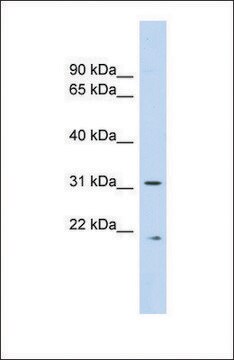C0355
Monoclonal Anti-μ-Calpain, Large Subunit antibody produced in mouse
clone 15C10, purified immunoglobulin
Synonyme(s) :
Anti-CANP, Anti-CANP1, Anti-CANPL1, Anti-SPG76, Anti-muCANP, Anti-muCL
About This Item
Produits recommandés
Source biologique
mouse
Niveau de qualité
Conjugué
unconjugated
Forme d'anticorps
purified immunoglobulin
Type de produit anticorps
primary antibodies
Clone
15C10, monoclonal
Poids mol.
antigen 80 kDa
Espèces réactives
rat, mouse, human, bovine
Technique(s)
immunoprecipitation (IP): 1-2 μg
indirect ELISA: 0.5-1 μg/mL
western blot: 0.5-1 μg/mL
Numéro d'accès UniProt
Conditions d'expédition
wet ice
Température de stockage
−20°C
Modification post-traductionnelle de la cible
unmodified
Informations sur le gène
human ... CAPN1(823)
mouse ... Capn1(12333)
Immunogène
Forme physique
Clause de non-responsabilité
Vous ne trouvez pas le bon produit ?
Essayez notre Outil de sélection de produits.
Code de la classe de stockage
10 - Combustible liquids
Classe de danger pour l'eau (WGK)
WGK 2
Point d'éclair (°F)
Not applicable
Point d'éclair (°C)
Not applicable
Certificats d'analyse (COA)
Recherchez un Certificats d'analyse (COA) en saisissant le numéro de lot du produit. Les numéros de lot figurent sur l'étiquette du produit après les mots "Lot" ou "Batch".
Déjà en possession de ce produit ?
Retrouvez la documentation relative aux produits que vous avez récemment achetés dans la Bibliothèque de documents.
Notre équipe de scientifiques dispose d'une expérience dans tous les secteurs de la recherche, notamment en sciences de la vie, science des matériaux, synthèse chimique, chromatographie, analyse et dans de nombreux autres domaines..
Contacter notre Service technique






